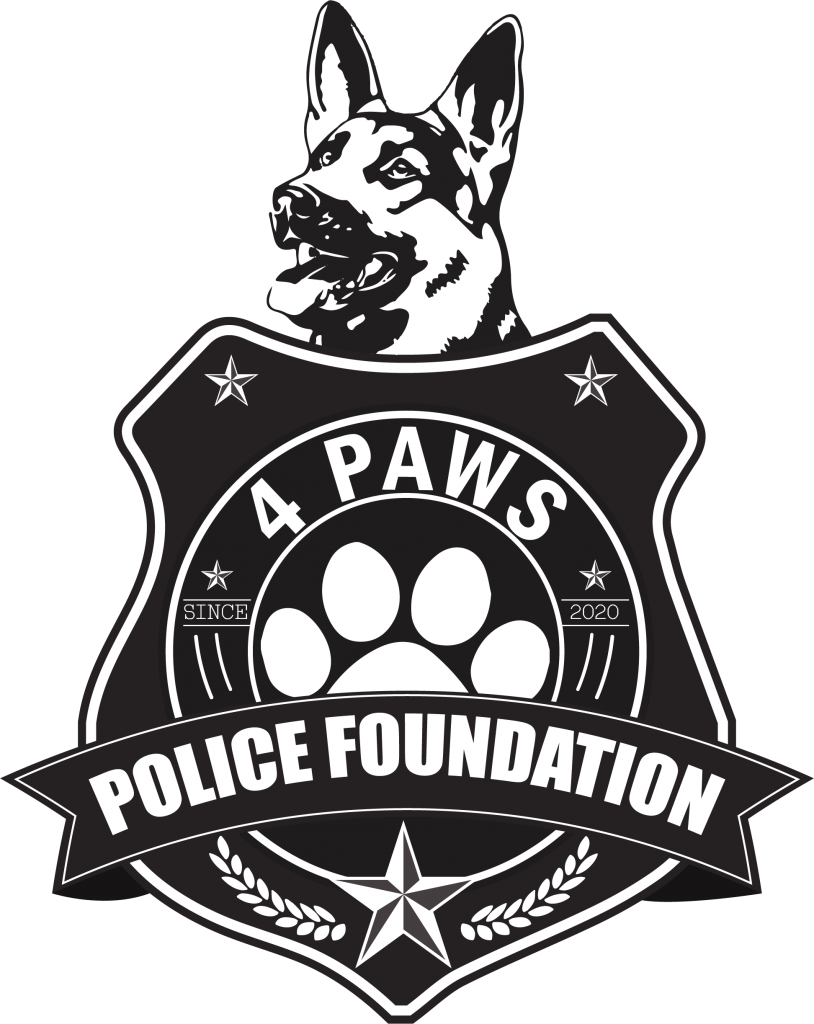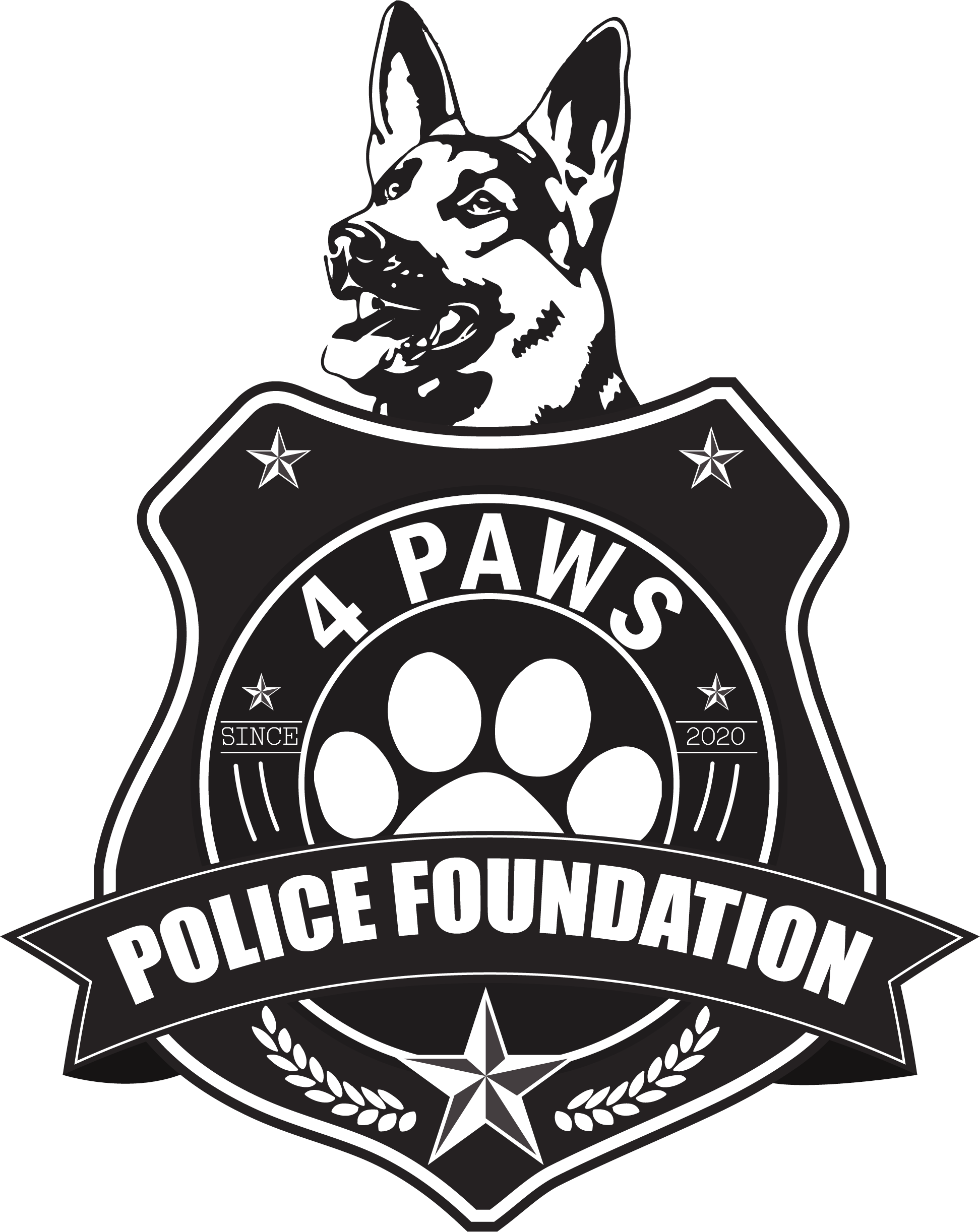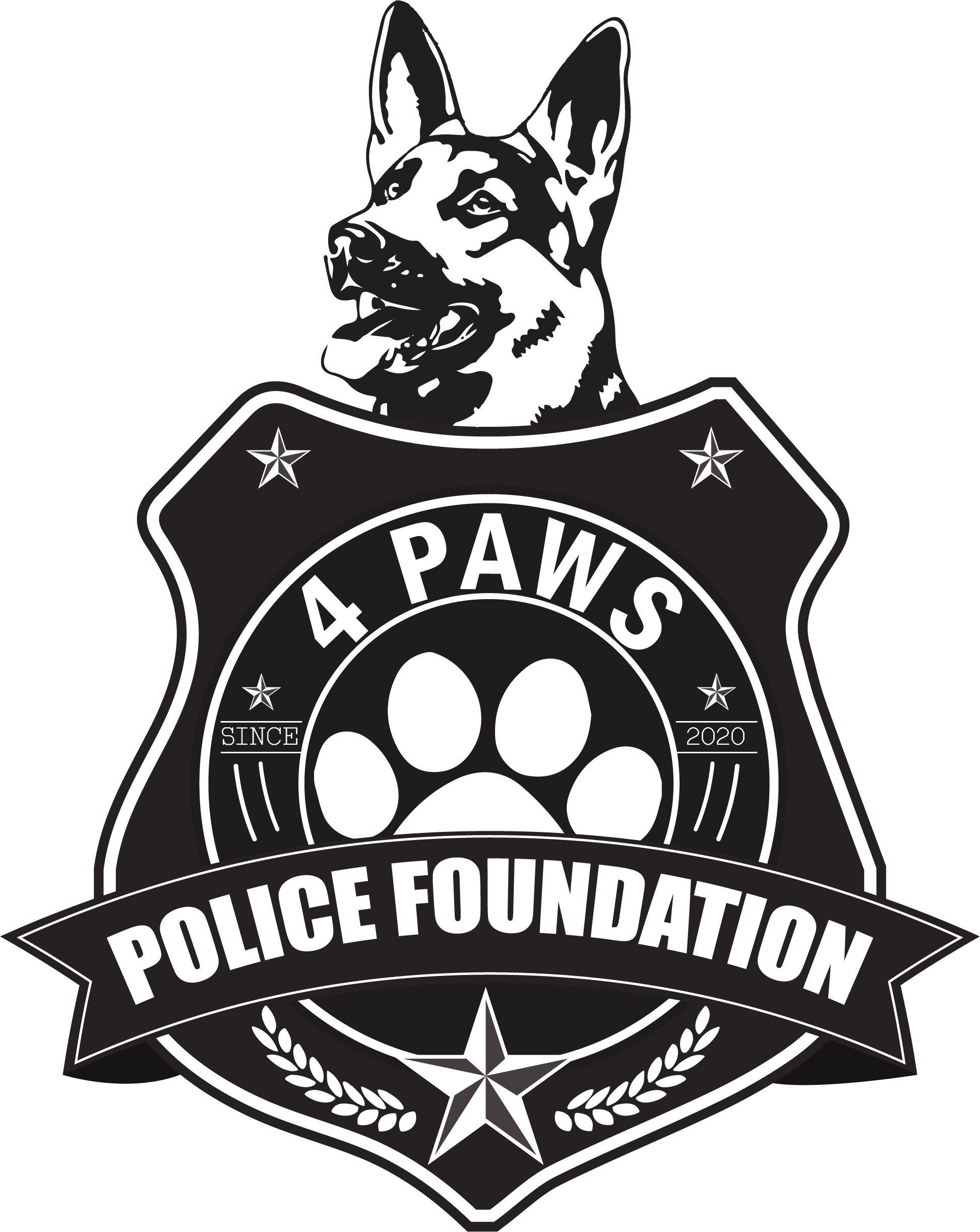FREQUENTLY ASKED QUESTIONS
1. What is 4 Paws Police Foundation
4 Paws Police Foundation is a Nationwide all-volunteer non-profit organization working to provide protective K9 equipment to underfunded Law Enforcement, Fire, Search & Rescue, and Military K9 Units throughout the United States. The specialized and custom K9 equipment includes, but is not limited to: K9 bullet & stab-proof ballistic vests, K9 First Aid Field Trauma Kits, K9 PCM Military Grade Cooling Vests, K9 Kevlar boots, K9 Narcan kits, oxygen recovery mask kits, and K9 vehicle heat alarm systems with the “No K9 Left Behind” and “WatchDog” features. 4 Paws Police Foundation is 100% unpaid volunteer operated.
2. How much does all this cost?
Each K9 vest is custom-built using high-end ballistic material and costs $1400 depending on the size of the K-9 and specific agency equipment requirements. Each law enforcement agency has different requirements and the final total cost is reflective of those customizations. Specialized SWAT K9 Tactical ballistic vests are also an option and start at $3700. K9 first aid field trauma kits are$350. Each of these items is specifically designed and ordered to meet specific agency needs, and K9 size where applicable. While the cost of these items is rather high, we believe that a price cannot be placed on the lives they save. We donate only the highest quality equipment to ensure a long duration of usability and to ensure this equipment holds up to the stress and use they will encounter on a daily basis. Our equipment advisory board consists of active K9 handlers and is constantly reviewing equipment to ensure only the best is donated. All equipment donated by 4 Paws Police Foundation exceeds NIJ standards, and most is military grade.
3. Is it worth the expense? After all, they’re just dogs and pets, right?
Law Enforcement K9s and Military dogs (MWD) are not just dogs. These K9s are highly trained, intelligent, and specialized. Most of them hold multiple certifications they must certify for yearly. As law enforcement and military activities becomes increasingly dangerous, agencies are relying more and more on the agility, versatility, speed, stamina, and senses of K9s to protect officers and citizens. Given the substantial investment of time and money in each dog’s training and care, and their contribution to the success of the agencies, it makes sense to protect them as they serve our community and country. Trained K9s can cost anywhere from $20k -$50k depending on their breeding, training, specializations, and health care costs. The investment in a protective vest and field kit greatly expands the duration of the K9’s life and ultimately reduces the costs most agencies could incur if the K9 is injured or killed on duty
4. Does a dog or cat really need an oxygen mask? Can’t they just use the normal masks used by most fire and EMT?
No. If you have pets then take a look at the oxygen masks your vet has. You will notice that they are of different shapes and widths to be used depending on the species and size of the animal. Larger dogs need a different mask than smaller cats. Birds, smaller animals like hamsters, and reptiles (yes we said reptiles) require much smaller and longer masks. The variations go on depending on the specific animal but the main point is that a human oxygen mask does not work on animals because they do not fit, and therefore do not provide the required oxygen. First responder agencies are typically not permitted to spend funds on equipment not designed to save human lives. Because these first responders cannot use equipment that is not on their truck, they are often left with little to no options to save the lives of domestic pets that have suffered from smoke inhalation, or pets that need to be resuscitated after losing consciousness from exposure to dangerous toxic fumes.
5. Do you make the equipment?
No. We do not make any of the equipment we donate nor do we support the use of “home-made” products. When lives are at stake only professionally made and field tested equipment should be used to ensure reliability and usefulness of the product as well as provide a warranty for the products. Those offering cheaper solutions are not offering the same items or quality of items and do not provide any warranties. Additionally, the cheaper options such as first aid kits that are assembled by hand and not under professional regulations (referred to as home made) are often compiled through use of discounted bulk purchase items that have sat on a shelf- which should not be done. Items in professional grade K9 first aid kits have expiration dates and should only be assembled when ordered to ensure a “fresh” product and provide the longest useful lifetime of the product as possible.
6. I am a K9 handler; how can I request a vest for my unit/canine?
Officers and handlers should click on the “Equipment Tab” and then click on “Grant Application” for a template letter about requesting K9 equipment. Please note that all requests are screened and verified. You must be part of a legally recognized first responder agency located in the USA to be considered for one of our grants.
7. My local Law Enforcement department doesn’t have a K9 unit. Where does my donation go?
8. How much of my donation will actually go to 4 Paws Police Foundation?
4 Paws Police Foundation is a 501(c)(3) non-profit organization and will receive 100% of your donation. In addition, all donations are tax-deductible. Donations made by PayPal, Square, GoFundMe, or another third-party payment system will incur standard processing fees and the remaining amount will be transferred to 4 Paws Police Foundation. Fees and rates are determined by these third-party providers directly and are subject to change. If you wish to avoid these fees we encourage you to donate via check or money order mailed directly to 4 Paws Police Foundation.
9. I want to fundraise for a K9, how much do I need to raise?
10. Can I determine which item my money goes to, or which agency?
13. How else can I help?
The How You Can Help page provides information about all the various ways you can contribute to our organization. For example, 4 Paws Police Foundation is in need of grant writers and marketing communications specialists to donate their services; interested parties should contact for more information. Spreading the word about our cause is also a big help. Come visit us at our fund-raisers, follow us on our social media sites like Twitter and “like” us on Facebook. All these actions help to bring awareness to the cause and contribute to our fundraising efforts. You can sign up to volunteer with 4 Paws Police Foundation. We can’t be everywhere at once, but make a larger impact through the generosity of time that our volunteers provide.
14. I’m in school, what can I do?
15. Do you accept donations of stocks/bonds, property, wills/estate disbursements, or donor advised investment donations?
16. How do I make a donation through my will or trust?
Please contact us to discuss your request. In general most states require you to have legal documentation drawn up by an attorney naming 4 Paws Police Foundation, Inc. as a beneficiary and specifically stating what the donation is; whether it is financial or physical (such as a house, boat, car, etc). Once that is in place you or your attorney would send us notification for our records.
17. I want to fundraise for an agency, how can I start?
Please contact us to discuss prior to starting. Most agencies require their approval prior to any fundraising activities. Some agencies require an approval process that may even include the requirement to have a special concession made or a vote to be held during a special counsel meeting. Military units have various processes across branches. Fundraising without written agency approval can lead to many problems of significant nature, including fraud accusations. It can also get the handler(s) involved in trouble at work for breach of protocol which could impact their career. To ensure agencies are aware of fundraising activities and approve them, 4 Paws Police Foundation will not support/endorse/associate with or in any manner support any fundraising activities or events without the express written permission of the agency and handler(s) directly via our organization’s authorization form.
18. Why can’t I make a donation to my local agency directly?
There is no standard answer for this. Some agencies will accept direct donations. Most will not. Each agency at every level (city/county/state/federal) has various rules around this. For the most part agencies will not accept direct donations from individuals, businesses, or groups because they are public service agencies and taking donations directly from the public is usually prohibited. In some cases there are political reasons or budgetary reasons.
4 Paws Police Foundation provides these agencies with a safe donation collection entity which holds no political, financial, or special interest. We hold no direct benefit from the donation so by virtue of being a national nonprofit we meet the requirements of all agencies to enable them to accept K9 equipment donations through our organization.
Donors who work through 4 Paws Police Foundation to donate to their agency of choice still receive direct acknowledgement for their donation and often get to meet the K9s and take pictures with the K9 Unit. In some cases donors will also receive special recognition directly from the agency.
Another point to consider is use of your funds. We hear increasing complaints that donor funds given directly to the agency were used for something other than the K9’s needs. When you donate directly to a Department or it’s Foundation they can legally use your funds for anything they want which does not have to be the K9 unit. That is the risk you take when direct financial donations are made to the agency instead of our organization. This is why we encourage you to donate through us. Not only do we ensure the equipment gets to the K9s and your funds are used appropriately, we provide you with proof and in many cases can arrange for you to meet the K9s.
19. I saw a K9 vest online cheaper than what you use, what’s the difference?
PCM cooling vests are not the same cooling vests available online. General dog cooling vests either require being frozen or must be submerged in water and only work for about an hour. These vests shock dogs from the frozen ice or leave them wet. PCM vests (Phase Change Material) were developed for the military using propriety gel packs that not only hold their cooling temperature for 4-6 hours, but also redirect heat away from the K9’s body. The gel packs are housed inside a thin material layer so they are not directly on the K9’s skin. This provides a cool, dry, comfortable, and light-weight duty vest the K9s can wear all shift long. Double-shift? No problem. The PCM vests only need to be placed on ice or around a bag of ice for 20 minutes and it will fully recharge for 4-6 hours. Many handlers use a small cooler in their vehicle to enable the vest to remain cool and prevent heat stroke. Please refer to our page for more information.
20. Where can I verify your organization?
20. Where can I verify your organization?
You can view our complete profile on GuideStar, the leading nonprofit verification and auditing site. 4 Paws Police Foundation is proudly the only Nationwide K9 Equipment Nonprofit awarded Guidestar’s Platinum Seal of Transparency. The Platinum Seal is only awarded to the top 1% of nonprofits; ensuring you can donate to 4 Paws Police Foundation with confidence he IRS website also contains a list of all approved nonprofits with 501c3 status. You can search their website or You can also verify us on GreatNonProfits and view verified reviews by the handlers we serve
21. Why aren’t K9s provided this equipment by their own agency?
Due to budget cuts and other economic issues 92% of all K9 units are run solely on donations. In almost all cases, the handlers must personally pay for their K9 partner’s needs which includes medical, food, grooming, training, certifications, and safety equipment such as K9 protective vests, K9 First Aid kits, K9 cooling vests, K9 heat alarms and more. Many people assume that because the K9 is an officer of the agency then the K9 must therefore get all the equipment it needs to be protected and that the agency pays for all its expenses. This assumption is entirely false. Most K9 units are considered “non essential” units and therefore generally do not receive budget funding. These underfunded agencies rely on 4 Paws Police Foundation to provide this vital K9 equipment, and we rely entirely on donations to fulfill these requests.
22. Do your suppliers also sit on your Board?
23. Can I purchase any of your equipment?
24. I want to raise awareness, can you arrange for a K9 Officer to visit my school or organization?
25. What Do Military Working Dogs Do?
A Department of Defense Military Working Dog Program article published by AMERICAN FORCES PRESS SERVICE, janauary 29, 2022. Colonel David Rolfe’s military career has gone to the dogs. As director of the Defense Department’s Military Working Dog Program, Rolfe and his staff are responsible for the health and welfare of some of the most unheralded members of the fighting force: its estimated 2,300 working dogs.These dogs, along with their handlers from every military service, are deployed worldwide to support the war on terror, helping to safeguard military bases and activities and to detect bombs and other explosives before they inflict harm.
Why Use Working Dogs?
With an acute sense of smell—five to 10 times stronger than a human’s—working dogs can detect minute traces of explosives or drugs and alert the handlers of their presence, Rolfe explained.
But at the same time, dogs have the ability to inflict fear in an aggressor in a way a human—even if armed—often can’t, and will defend their handlers to the end. “People see a dog and don’t want to mess with it,” said Staff Sgt. Andrew Mier, a military working dog trainer who has deployed to Southwest Asia three times as a handler—twice to Saudi Arabia and once to Qatar. “A dog creates a strong psychological deterrent.”
Working Dog Breeds
The vast majority of U.S. military working dogs are German and Dutch shepherds, and Belgian Malinois breeds Rolfe said are “very aggressive, very smart, very loyal and very athletic.”
“We expect so much of them that we need them to be strong and athletic,” he said. “We want a high-strung dog with aggressive tendencies because that’s what the mission demands.”
Dogs have long been recognized as “force multipliers” by military fighting forces around the world, Rolfe said. The Romans put razor-sharp collars around their dogs, then sent them into the enemy’s ranks to bite and cut their foes.
History of DOD Working Dogs
The U.S. military has used working dogs since the Revolutionary War, initially as pack animals, and later, for more advanced uses, such as killing rats in the trenches during World War I, he said.
But World War II witnessed the biggest surge in the use of working dogs to support military operations. The U.S. military deployed more than 10,000 specially trained canines, most as sentries, but others as scouts, messengers and mine detectors, Rolfe explained.
Today, “a couple hundred” working dogs are serving with U.S. forces in Iraq and Afghanistan as patrol dogs and explosives and drug detectors, Rolfe said, adding that contractors use additional dogs in the theater. Nearly 2,000 more working dogs provide similar services at U.S. bases and operating posts around the world.
Meanwhile, the military is increasing its reliance on working dogs. Before Sept. 11, 2001, Rolfe said Air Force security forces trained about 200 working dogs a year for the Defense Department. That number is up to more than 500, with the vast majority of dogs being trained as sentries and bomb-sniffers.

4 Paws for Police Foundation is a 501(c)3 Non-Profit Organization. Donations Are Tax Deductible As Permitted Under IRS Regulations..

